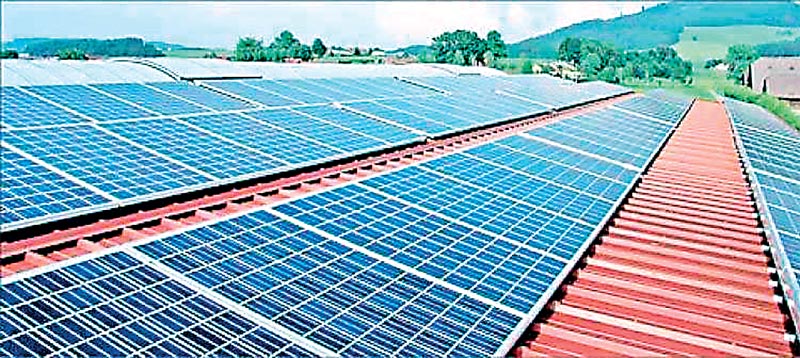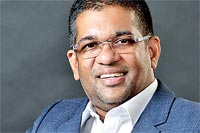Sunday Feb 22, 2026
Sunday Feb 22, 2026
Thursday, 17 February 2022 02:49 - - {{hitsCtrl.values.hits}}

CDB’s first focus in this long-term plan is to lead the charge in Rooftop Solar financing in Sri Lanka. Considering the current status quo, there are three forms of renewable energy considered globally as viable alternatives to fossil fuels, in addition to hydroelectricity, which is already well established. These are Nuclear, Wind and Solar energy
|
 By Damith Tennakoon
By Damith Tennakoon
We are burning up the planet. If we don’t rectify matters now, there won’t be an Earth left to save. According to the latest Inter governmental Panel on Climate Change report1 – the world’s latest and most rigorous scientific assessment of the physical basis of climate change - the changes occurring now are unprecedented in centuries and accelerated.
The report categorically states that unless action is taken immediately, and we make sharp reductions in greenhouse gas emissions in the coming decades, global warming will exceed 1.5 degrees Celsius. The evidence is all around us. The question is what can, and should we do?
This is a question that underpins every strategic decision made at CDB. Throughout our journey we have put sustainability first, empowering a smarter and sustainable Sri Lanka. This is not only because we want to grow as a business and make profits, but more so because we would like to do business with a healthy people in a healthy planet.
It is this triple bottom-line strategy that United Nations and other international bodies on the environment and sustainability have been lobbying for, for decades. Today, the world is on the verge of an ‘either now or never’ situation on this issue.
The need of the hour is to minimise human-induced global warming and all the perils associated with it, by limiting cumulative carbon dioxide emissions, reaching at least net zero. What this means in practice, is to reduce and eventually eliminate fossil fuel consumption, and move towards alternative energy sources to ensure the continuation of industry with minimal destruction to the planet.
According to the experts, if we don’t, we can look forward to more frequent and intense hot extremes, marine heat waves, heavy precipitation, agricultural and ecological droughts in some regions, intense tropical cyclones, and reductions in Arctic Sea ice, snow cover and permafrost. Some of these effects are irreversible, and all of them are damaging.
At CDB, we have taken the call to invest in a Net Zero Future and Green Economy, with an ambitious set of milestones.
As a financial institution recognised for our sustainability commitment – we’ve been among the top 10 in the Best Corporate Citizen Sustainability Awards for four consecutive years – we are working towards being the leader in sustainable finance by 2030, advancing the green economy.
CDB’s first focus in this long-term plan is to lead the charge in Rooftop Solar financing in Sri Lanka. Considering the current status quo, there are three forms of renewable energy considered globally as viable alternatives to fossil fuels, in addition to hydroelectricity, which is already well established. These are Nuclear, Wind and Solar energy.
Of these, nuclear energy generation is not viable for a country like ours, and Wind Farms require large investments to be set up. However, the one energy source we have in abundance is Solar, and it is a pity we have not taken better advantage of the year-round sunlight our country is blessed with. According to a report published by the Asian Development Bank in 20192, in 2017 alone Sri Lanka used 12.8 million tons of oil equivalent energy. Petroleum accounted for about 43% of primary energy supply in Sri Lanka, biomass provided 37%, and coal provided 11%. These are staggering numbers and are projected to grow faster due to increased use.
According to the same report, Sri Lanka’s per capita electricity consumption was 626 kWh per person in 2017, which works out to just over 200 kWh per month on average, for a family of four. A large portion of this energy is generated by burning fossil fuels, while the contribution of the energy that heats up our rooftops round the year and goes otherwise unutilised, is minimal.
We believe that we must come together as a nation to rectify this error and help the planet. At CDB, we have a target of supporting the setting up of 100,000 Rooftop Solar systems with convenient financing stretched over five years. We calculate monthly payments to be compatible with the customers’ average electricity bill if they were to buy electricity from the grid, so as to balance out the investment.
This will leave the earnings from excess electricity sold back to the system as a handsome profit that grows over the years. CDB’s strategy for incentivising the use of renewable energy is also aligned to the National Vision for a sustainable Sri Lanka as outlined by the Sri Lankan Government.
While solar rooftops come with a definite financial advantage making them a viable investment, they also serve the larger social purpose of sustainability, which we strive towards. At CDB we have already begun the rollout of a plan to limit the amount of fossil fuel generated electricity used in our offices, beginning with the conversion of 25% of our branches to solar power in the next two years.
One major step in that direction is to convert the roofs of all 71 CDB branches around the island to solar rooftops generating electricity needed for the branches. While some locations pose logistical challenges to overcome, we are determined to see them through and practice what we preach.
It is a responsibility of Sri Lankans with the resources and the rooftop real estate, to come forward to make use of the incentives given by the State to transition to renewable energy in the form of solar rooftops. Just like the extra fan or light bulb in our buildings will slowly but surely push global temperatures to rise over 1.5 degrees Celsius, so will the little things we do now snowball into big results, to protect our people, our planet, and our profits.
(The writer, the Deputy CEO and Chief Financial Officer at CDB, is at the helm of their drive to establish sustainability and employee engagement as a business practice. A Fellow of the Chartered Institute of Management Accountants, UK, and a Chartered Global Management Accountant, Tennakoon is an industry veteran of 30 years and has been at CDB since 2003. He was among the key executives who helped steer the company through turbulent times to emerge as one of the top five non-banking financial institutions in the country, with an asset base of nearly Rs. 100 billion.)
Footnotes:
1ipcc.ch/2021/08/09/ar6-wg1-20210809-pr/
2adb.org/sites/default/files/institutional-document/547381/sri-lanka-energy-assessment-strategy-road-map.pdf